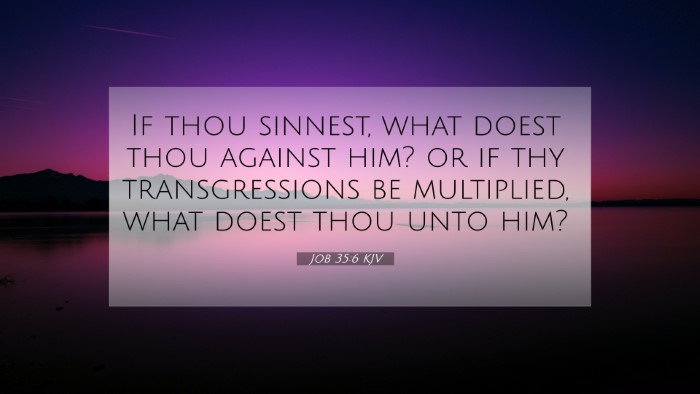Old Testament
Genesis Exodus Leviticus Numbers Deuteronomy Joshua Judges Ruth 1 Samuel 2 Samuel 1 Kings 2 Kings 1 Chronicles 2 Chronicles Ezra Nehemiah Esther Job Psalms Proverbs Ecclesiastes Song of Solomon Isaiah Jeremiah Lamentations Ezekiel Daniel Hosea Joel Amos Obadiah Jonah Micah Nahum Habakkuk Zephaniah Haggai Zechariah MalachiJob 35:6 Similar Verses
Job 35:6 Cross References
If thou sinnest, what doest thou against him? or if thy transgressions be multiplied, what doest thou unto him?
Uncover the Rich Themes and Topics of This Bible Verse
Listed below are the Bible themes associated with Job 35:6. We invite you to explore each theme to gain deeper insights into the Scriptures.
Job 35:6 Cross Reference Verses
This section features a detailed cross-reference designed to enrich your understanding of the Scriptures. Below, you will find carefully selected verses that echo the themes and teachings related to Job 35:6 KJV. Click on any image to explore detailed analyses of related Bible verses and uncover deeper theological insights.

Proverbs 8:36 (KJV) »
But he that sinneth against me wrongeth his own soul: all they that hate me love death.

Jeremiah 7:19 (KJV) »
Do they provoke me to anger? saith the LORD: do they not provoke themselves to the confusion of their own faces?

Proverbs 9:12 (KJV) »
If thou be wise, thou shalt be wise for thyself: but if thou scornest, thou alone shalt bear it.
Job 35:6 Verse Analysis and Similar Verses
Understanding Job 35:6
Job 35:6 states, "If you are righteous, what do you give to Him? Or what does He receive from your hand?" This verse presents a complex theological inquiry about the nature of righteousness and its significance in relation to God. Below, we explore the meanings derived from this verse through the insights from various public domain commentaries.
Summary of Job 35:6
In this verse, the character Elihu is speaking, emphasizing that God's relationship with humanity and our righteousness holds different meanings than might be traditionally understood. Elihu posits that human righteousness does not add to God's perfection or change His nature, but rather, it's beneficial for the individual.
Insights from Commentaries
- Matthew Henry: Henry explains that Elihu is addressing the misconception that God benefits from human righteousness. Elihu stresses that God does not require our righteousness but is instead concerned with how we act towards others and our own spiritual well-being.
- Albert Barnes: Barnes comments on the futility of thinking that human acts can enhance God's standing or fortune. He highlights the individual impact of righteousness, primarily serving the person who practices it rather than altering God’s divine nature.
- Adam Clarke: Clarke takes a deeper theological approach, suggesting that righteousness serves to align individuals with God's will. He asserts that this alignment fosters a proper understanding of God’s justice and goodness, emphasizing that the primary benefit of righteousness is to the believer.
Theological Implications
This verse invites readers to contemplate the essence of righteousness and its relational dynamics with God. It underscores the idea that:
- God is not dependent on human righteousness for His majesty.
- Righteousness should be pursued for personal spiritual growth.
- Understanding God's justice can lead to a greater appreciation of His divine nature.
Bible Verse Cross-References
Here are several verses that are thematically linked to Job 35:6:
- Psalm 16:2: "I said to the LORD, 'You are my Lord; apart from you I have no good thing.'”
- Romans 3:20: "Therefore no one will be declared righteous in his sight by the works of the law; rather, through the law we become conscious of our sin."
- Isaiah 64:6: "All of us have become like one who is unclean, and all our righteous acts are like filthy rags."
- Proverbs 21:3: "To do what is right and just is more acceptable to the LORD than sacrifice."
- Job 22:2-3: "Can a man be of benefit to God? Can even a wise person benefit him?"
- Galatians 2:16: "...a person is not justified by the works of the law, but by faith in Jesus Christ..."
- Micah 6:8: "He has shown you, O mortal, what is good. And what does the LORD require of you? To act justly and to love mercy and to walk humbly with your God."
- Job 35:8: "Your wickedness only affects humans like yourself, and your righteousness only benefits other people."
- Philippians 3:9: "And be found in him, not having a righteousness of my own that comes from the law, but that which is through faith in Christ..."
- Luke 18:9-14: A parable emphasizing the humility necessary in recognizing oneself before God, contrasting a self-righteous attitude.
Connections between Bible Verses
This exploration of Job 35:6 illustrates the rich inter-Biblical dialogues and thematic connections. By examining the links between the Old Testament and New Testament verses, we can deepen our understanding of God's character and human responsibility.
Thematic Bible Verse Connections
Many themes emerge when connecting verses with Job 35:6:
- Righteousness: Understanding that while righteousness is crucial, its purpose is ultimately relational and not transactional with God.
- Divine Sovereignty: Recognizing that God's sovereignty is untouched by human actions.
- Human Accountability: Emphasizing personal moral responsibility in our actions towards others and ourselves.
Tools for Bible Cross-Referencing
For those seeking to delve further into biblical texts and their relationships, a variety of resources are available:
- Bible Concordance: A comprehensive tool for finding specific words and their biblical occurrences.
- Bible Cross-Reference Guide: Helps identify verses that support or relate to a particular scripture.
- Cross-Reference Bible Study: Techniques for studying the Bible by examining how verses relate to one another thematically.
Conclusion
Job 35:6 serves as a profound reminder of the relationship between human righteousness and God's perfection. It encourages a reflection not merely on one's moral actions, but on their significance in the grand narrative of faith and divinity. Through the analysis and cross-referencing of related Bible verses, we can build a comprehensive understanding of God's expectations and the meaning of righteousness in our lives.


